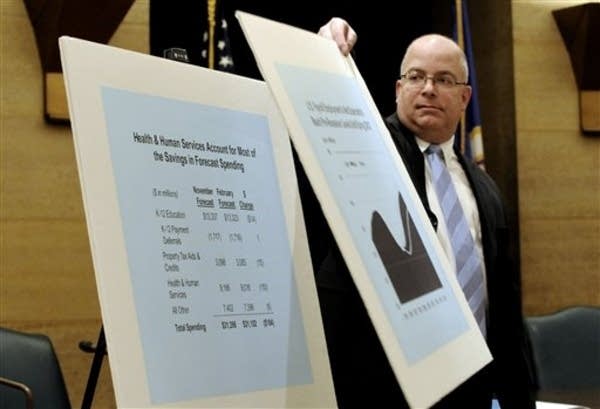Beyond this year's $1 billion, a bigger state budget problem
Go Deeper.
Create an account or log in to save stories.
Like this?
Thanks for liking this story! We have added it to a list of your favorite stories.

DFL lawmakers will start work Wednesday on a budget plan that erases the state's nearly $1 billion deficit.
State finance officials said Tuesday that the state's budget outlook improved slightly over the past three months, but they are projecting a mammoth budget problem in the future.
Democrats say the forecast is a symbol of Gov. Tim Pawlenty's legacy. Pawlenty argues there are other factors at play, and whoever succeeds Pawlenty as governor could be facing an even bigger budget gap.
Finance officials are projecting Minnesota will have a $5.8 billion budget deficit in the next two-year budget cycle. Factor in inflation and the problem grows to nearly $7 billion.
Turn Up Your Support
MPR News helps you turn down the noise and build shared understanding. Turn up your support for this public resource and keep trusted journalism accessible to all.
DFL Senate Majority Leader Larry Pogemiller says the budget gap will be Pawlenty's legacy.
"He's going to leave office with a $5 billion structural problem," Pogemiller said. "One of his favorite elected officials is Ronald Reagan. I think that answers the question: 'Is Minnesota better off when Tim Pawlenty leaves office?' The answer is a resounding no."
Infographic
See details of Minnesota budget forecasts, 2001-2010.
Pogemiller criticized Pawlenty for relying too heavily on accounting shifts and one-time money to balance the budget.
Pogemiller also said the governor's tough talk on balancing the current budget problem with cuts alone hasn't yet materialized as the governor's budget relies on only $600 million in permanent spending cuts. The rest is one-time money and federal funding that Congress hasn't approved yet.
House and Senate DFLers haven't yet released their plan to balance the current budget deficit.
For his part, Pawlenty says he doesn't think the state's long-term budget problem will be as severe as projected. But under his best case scenario, he says the deficit for the next two-year budget will be roughly $3 billion, and that's only if the Legislature makes his unilateral spending cuts permanent, passes his budget plan and put his school payment shift into law.
Pawlenty also argues that he's been governor during the nation's worst recession in decades.
"We have balanced the budget every time I've been governor, every two years. It will be balanced in the future," Pawlenty said. "The notion that it won't be is a projection and it will be dealt with. This is no different than what other states are facing, not something that is unique to Minnesota, other than our exorbitant spending, but because of the worst economic crisis since World War II."
Minnesota's constitution requires a balanced budget. Pawlenty will also leave office before the current budget cycle is finished, meaning the next governor may have to solve the current budget problem as well as assemble the next biennium's budget.

Republicans in the House and Senate say it's not Pawlenty's fault that the state is facing long-term budget problems. Republican House Minority Leader Kurt Zellers said lawmakers need to rein in state spending that's projected to grow above revenue collections.
"You take whatever you have, whatever is in the kitty today. You spend just what you have. You don't go above and beyond," Zellers said. "Under that, revenues are going to go up 10 percent, $33 billion. We're going to have and spend more money. I guess where you can say there's room for improvement is to bend the curve, so to speak, on government programs that are on autopilot."
Another House Republican said the problem of long-term budgeting could be fixed if the Legislature would allow the public to vote on Pawlenty's proposed constitutional amendment that limits future spending to current revenue collections. However, Pawlenty admits that plan is going nowhere, and his proposed budgets have not adhered to it.
DFL House Speaker Margaret Anderson Kelliher, who may inherit the problem if she is elected governor, said the problem is Pawlenty's refusal to accept tax increases.
"This is an ongoing revenue [and] jobs problem and a governor who has not heeded, first, the yield signs, and now, the bright stop sign that says, 'You should reconsider how you are doing this.'" Kelleher said. "He has been unwilling to do that. We have been very upfront with Minnesotans and believe a balanced approach to the budget has been the best solution."
House and Senate Democrats say they plan to release their budget proposal in parts. They won't say whether they will propose a tax increase.



